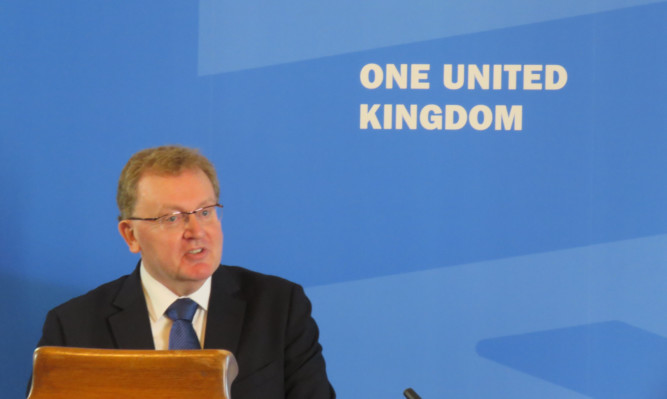Scottish Secretary David Mundell’s absence from talks on a new funding deal for Scotland is “bizarre and frankly quite unacceptable”, a senior SNP MP has said.
The Commons heard there have been five meetings between UK Treasury Minister Greg Hands and Scotland’s deputy first minister John Swinney to discuss the funding deal, known as the fiscal framework, which will accompany new tax and welfare powers for Holyrood.
But the SNP’s Eilidh Whiteford urged Mr Mundell to explain why he has been deemed “irrelevant” to the “critical” negotiations.
In the same questions session, Mr Mundell also signalled he agreed with the suggestion that talk of a second Scottish independence reference is a “smokescreen” used by the Scottish government to avoid accountability to voters.
Speaking in the Commons, Ms Whiteford (Banff and Buchan) told Mr Mundell: “I think many people will find it bizarre and frankly quite unacceptable that you are not even attending the negotiations of Scotland’s fiscal framework.
“Can you explain why your office as secretary of state seems to have been deemed irrelevant to these critical negotiations?
“And given that you’re not directly involved in the negotiations, can you share your personal view of whether you agree with the learned professors and the STUC on the preferred model?”
Mr Mundell replied: “I think what many people in Scotland will find bizarre is at a session in Parliament called Scottish questions that the Scottish National Party could come up with only one question, which they were clearly all told to ask.
“But I know it may impinge on the self-importance that some SNP MPs attribute to themselves but it is the deputy first minister of Scotland, John Swinney, who is negotiating the agreement not SNP MPs.”
Shadow Scottish secretary Ian Murray told the Commons: “You’d have thought that the pantomime season was over but judging by today’s questions it clearly isn’t.”
He accused Mr Mundell of creating a “sham” by keeping the negotiations “secret” and warned Scots are being “kept in the dark”.
Mr Murray asked the Scottish Secretary: “Will you put an end to this pantomime of manufactured grievance and be completely transparent about the fiscal framework?”
Mr Mundell replied: “The Government is completely transparent about its position in relation to the fiscal framework.
“We want it agreed as soon as possible, we want it to be scrutinised by both parliaments.”
Earlier, Conservative Alberto Costa (South Leicestershire) turned talk onto a second Scottish independence referendum.
He asked Mr Mundell: “Do you agree that with the transfer of the new extensive powers which you have just agreed will be given to the Scottish Parliament, it will for once put the SNP Government truly to be accountable to the Scottish people – and that this talk of a second referendum is just a smokescreen to take away their accountability to the Scottish people?”
Mr Mundell replied: “I absolutely agree with you that the impression created again today by the SNP is that they’re entirely driven by process arguments, not about getting on with getting an agreement on the fiscal framework, about getting the new powers in place and then do something positive for the people of Scotland with those powers.”
